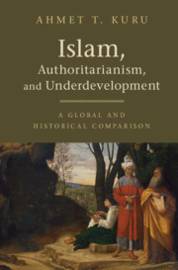
Why do Muslim majority countries exhibit high levels of authoritarianism and low levels of socio-economic development in comparison to world averages?
This is the key question informing Ahmet T. Kuru’s new book – Islam, Authoritarianism and Underdevelopment: A Global and Historical Comparison (Cambridge, 2019) – which he will present at this MidEast Breakfast at PRIO.
Kuru takes issue with the argument that Islam is the cause, drawing on historical comparisons to demonstrate that Muslims were philosophically and socio-economically more developed than Western Europeans between the ninth and twelfth centuries.
He also goes against the argument that colonialism is key. Historically, the decline of Muslim societies started well before the onset of colonialism.
Rather, argues Kuru, a particular alliance – between orthodox Islamic scholars (the ulema) and military states – developed, pushing aside intellectuals and the bourgeoisie. Ultimately, this blocked intellectual and economic creativity, according to Kuru, and is at the heart of the problems facing most Muslim majority states.
Ahmet T. Kuru is professor of political science at San Diego State University. He was a postdoctoral scholar and assistant director of the Center for the Study of Democracy, Toleration, and Religion at Columbia University. He is the author of Secularism and State Policies toward Religion: The United States, France, and Turkey (Cambridge, 2009).
Comments on Kuru’s presentation will be given by Knut S. Vikør, University of Bergen.
Kristian Berg Harpviken, PRIO Middle East Centre Director, will moderate the event.
MidEast Breakfast
The PRIO Middle East Centre hosts a series of breakfast seminars, catering to Oslo’s diverse community of MidEast watchers. The series will draw attention to current issues, and discuss those in the light of historical, regional and global trends. The MidEast Breakfast provides an opportunity to combine breakfast with food for thought in a compact one-hour format.





